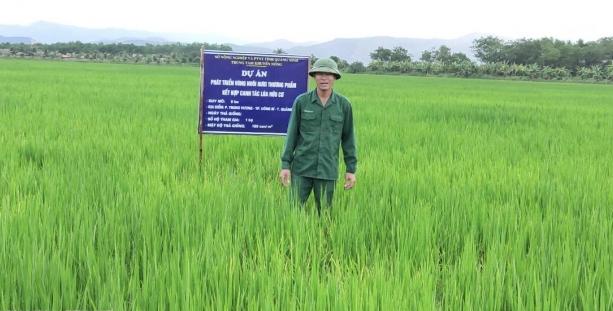November 26, 2025 | 08:39 GMT +7
November 26, 2025 | 08:39 GMT +7
Hotline: 0913.378.918
November 26, 2025 | 08:39 GMT +7
Hotline: 0913.378.918

Quang Ninh develops a commercial farming area, combining organic rice and sea worm growing in 90 ha in Dong Trieu, Uong Bi and Quang Yen districts. Photo: Anh Thang.
Agricultural Promotion Center in the coastal province of Quang Ninh has developed a commercial farming project that combines organic rice cultivation and sea worm raising in 90 hectares in 2020.
The sea worm, which is a favorite ingredient in the local cuisine, often lives along the river area in the districts of Dong Trieu, Uong Bi, and Quang Yen.
In the area, local farmers have embanked the riverbank into ponds and lagoons right in the rice fields to raise the sea worm by themselves spontaneously. Having potential but natural farming like that also faced limitations in breeds, farming procedures, and raising techniques.
In order to sustainably develop the resources and create a stable income for people, Quang Ninh Agricultural Promotion Center has implemented a project supporting farmers with sea worm breeds, agricultural materials, and production monitoring diaries to improve both rice and sea worm productivity.
According to the center, all cultured species in the project were well developed, promising an average yield of 300-350 kg of sea worm per ha per year, an increase of about 200-250 kg per ha per year compared with the natural raising. The rice yield also reached between 1.6 and 1.8 tonnes per ha each crop.
It was expected to have the first harvest of the combined products in January 2021, estimating the possible generate income from sea worm and rice to reach VND120-150 million (US$5,200-6,500) per ha.
Deputy director of the center, Nguyen Ba Lam said: “The center will continue to provide technical guidance to farmers, tours to help them exchange and learn experiences from other sea worm breeding facilities in other localities.”
Lam added they would also promote and support of the product consumption and build the brand for the sea worm of Quang Ninh in the market. Lam also called for more investment to develop other areas with the natural sea worm population in the province.
Author: Anh Thang. Translated by: Do Do. Edited by: Duc Huy.
/2025/11/24/3536-2-112800_176.jpg)
(VAN) Dong Nai now has tens of thousands of hectares of forests certified for sustainable management, and this area will continue to be expanded in the coming period.

(VAN) Vinh Ha hamlet (Dai Xuyen commune, Hanoi) is shifting away from small-scale farming as households adopt bioscurity into their breeder chicken models.

(VAN) Heavy rains make aquatic species more vulnerable to disease. Proactive water management and high-tech systems help farmers prevent outbreaks and protect yields.

(VAN) Greenhouses are shifting production mindsets in Binh Lu commune, enabling farmers to ‘weather the sun and rain’ and secure stable vegetable harvests throughout the year.

(VAN) Green transition is crucial for the Mekong Delta amid climate change and stricter standards, offering a path toward sustainability.

(VAN) Dong Thap promotes agricultural restructuring, forms large specialized farming zones, raises the value of agricultural products and develops toward ecological and high-tech directions.
/2025/11/22/4018-4-213342_747.jpg)
(VAN) The Mekong Delta Agricultural Experts Club has attracted 143 experts and researchers to participate in providing consultancy and contributing initiatives to the development of one million hectares of high-quality rice.